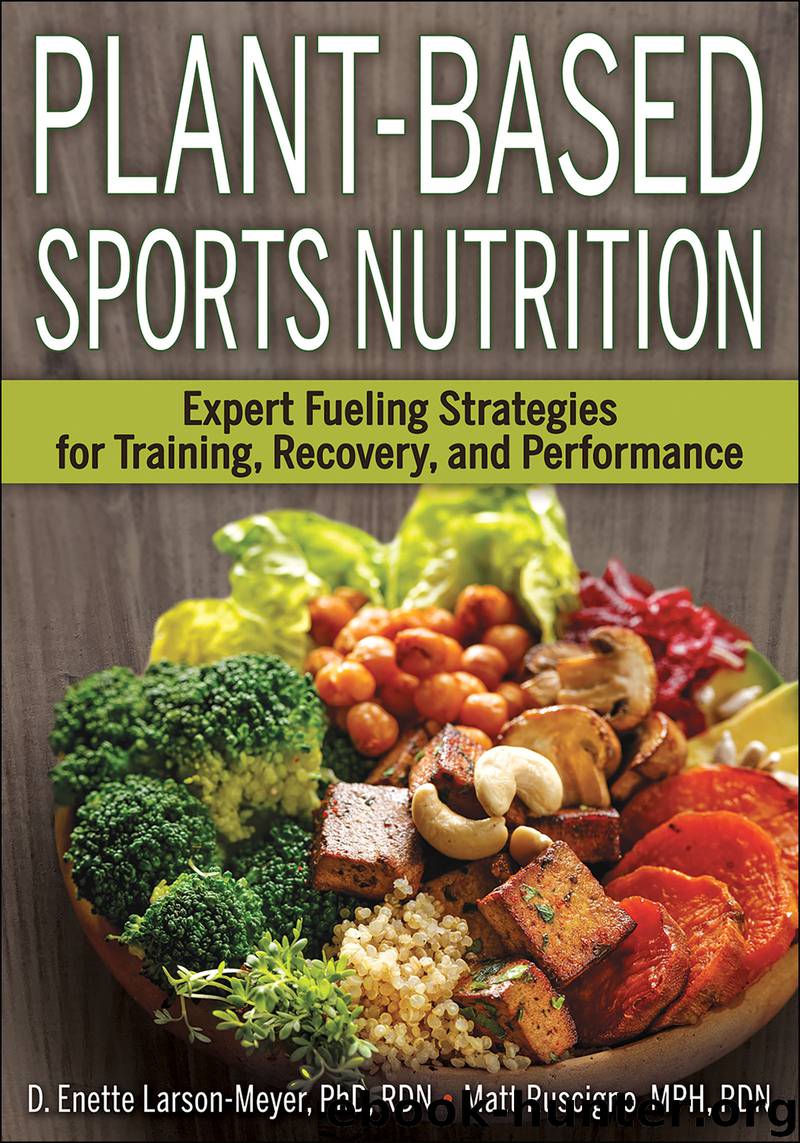Plant-Based Sports Nutrition by D. Enette Larson-Meyer

Author:D. Enette Larson-Meyer
Language: eng
Format: epub
Publisher: Human Kinetics, Inc.
If you cannot answer yes to each of these questions, why take a supplement? Don’t expect supplements to replace a daily balanced diet.
Evaluate the Product and Its Claims
The first step in evaluating a supplement is to carefully evaluate the product and the claims being made. This includes taking a look at who is making the claims and whether the claims seem possible. Many times, products are sold by testimonials from other athletes, fitness buffs, self-proclaimed nutritionists, or medical doctors, all of whom can be convincing. If the product sounds too good to be true, it probably is. Also, consider whether the product claims that it contains secret ingredients or special formulas. Under an amendment to DSHEA, companies are now required to list all of the ingredients but are not required to tell which ones are likely to be beneficial. For example, creatine and caffeine have known chemical structures with known actions, but they are not heavily advertised by themselves. Instead, cocktails containing “magic,” “proprietary,” or “special” formulas of these and other ingredients are advertised. Although it is probably more profitable and exciting to offer a special concoction, such formulas require that you—the athlete—look up each ingredient to determine its possible effectiveness and safety. Furthermore, it is less likely that research supporting the benefit of a formula is available than research on a pure herb or compound. And it is more likely the formula could contain contaminants along with suspect ingredients.
Determine Whether Research Exists to Back Up the Claim
The next step is to determine whether adequate and scientifically sound research is available to back up the supplement’s claims or support its effectiveness. The research should, of course, be done on humans, preferably athletes, and not on mice, rats, or chickens. Also, you don’t need to have a PhD in nutrition to figure out whether the research is sound. This step entails checking the supplement company’s website (which typically lists supporting studies), calling the company to get further details, and most importantly, searching for the product and published product research from reputable sources including the NIH Office of Dietary Supplements or PubMed Central if you are interested in looking for the research yourself (see table 10.1). In your search, remember that a compelling story or a single study does not signify research. Neither does an abstract or two from a meeting or an unpublished study described only on a supplement company’s website. The studies conducted should also include controlled clinical trials.15 Those that provide the strongest evidence are randomly assigned, placebo controlled, and double or single blinded. Randomly assigned, placebo controlled means that about half the athletes are randomly assigned to take the supplement and the other half are assigned to take the look-alike placebo that has no supplement.1 Double blinded means that neither the athlete nor the investigators conducting the test know who is taking what. This helps eliminate bias on the part of the athlete and the investigator. Single blinded means that just one party, for example, the athlete, is unaware of who is taking what.
Download
This site does not store any files on its server. We only index and link to content provided by other sites. Please contact the content providers to delete copyright contents if any and email us, we'll remove relevant links or contents immediately.
How to Be a Bawse: A Guide to Conquering Life by Lilly Singh(6686)
Deep Work by Cal Newport(5452)
The Longevity Diet by Valter Longo(4444)
The Fat Loss Plan by Joe Wicks(4232)
The Four-Pack Revolution by Chael Sonnen & Ryan Parsons(3480)
The Ultimate Bodybuilding Cookbook by Kendall Lou Schmidt(3309)
The French Women Don't Get Fat Cookbook by Mireille Guiliano(2975)
Super Food Family Classics by Jamie Oliver(2905)
Turn Up Your Fat Burn! by Alyssa Shaffer(2810)
Factfulness_Ten Reasons We're Wrong About the World_and Why Things Are Better Than You Think by Hans Rosling(2751)
Not a Diet Book by James Smith(2715)
Tom Kerridge's Dopamine Diet: My low-carb, stay-happy way to lose weight by Kerridge Tom(2674)
Body Love by Kelly LeVeque(2627)
Self-Esteem by Matthew McKay & Patrick Fanning(2599)
The Unbecoming of Mara Dyer by Michelle Hodkin(2479)
Tone Your Tummy Type by Denise Austin(2364)
The Fat Chance Cookbook by Robert H. Lustig(2316)
LL Cool J's Platinum 360 Diet and Lifestyle by LL Cool J(2310)
Men's Health Best by Men's Health Magazine(2090)
